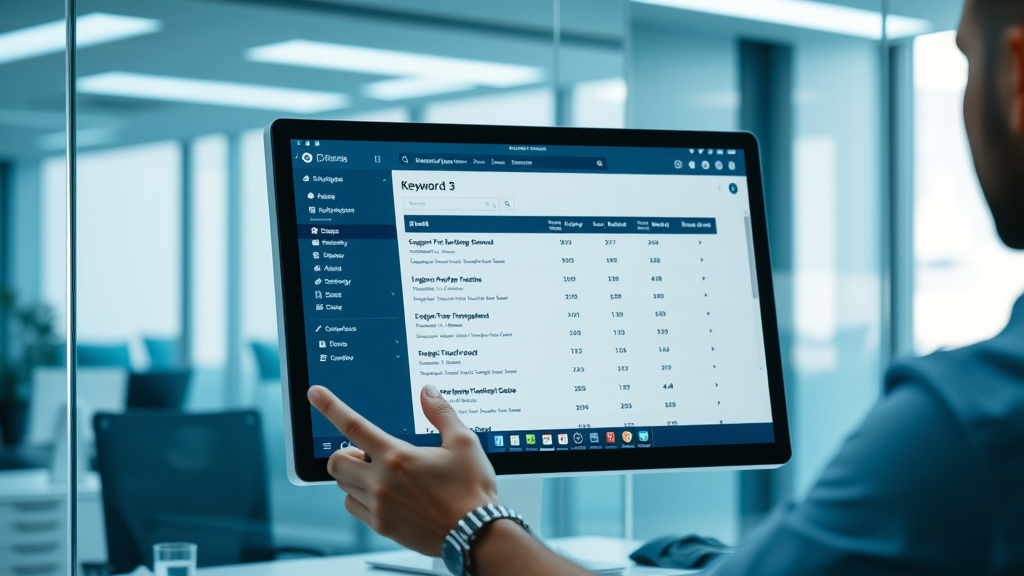Unveiling Website Optimization for Local Businesses: Why Local SEO Can Make or Break Your Local Business
Did you know that nearly 46% of all Google searches are seeking local information ? If your local business isn’t optimized, you’re invisible to almost half of your potential customers. Website optimization for local businesses isn’t just a checkbox—it could determine if your storefront buzzes with activity or remains a hidden gem. Local SEO has evolved into an essential element of small business survival, helping bridge the gap between digital discovery and foot traffic. As your competitors double down on their SEO strategy , only those who proactively improve local ranking and synch with Google Business and Google Maps will grab the top spots in local search results. Understanding how basic and advanced website optimization techniques work will be the edge your local business needs to dominate search engines—and win more loyal customers right in your community.

"Nearly 46% of all Google searches are seeking local information. If your local business isn’t optimized, you’re invisible to almost half of your potential customers."
Improving local ranking
Mastering Google Business Profiles
Leveraging schema markup for website optimization for local businesses
Understanding Website Optimization for Local Businesses and Its Role in Local Search
Defining Website Optimization for Local Businesses in the Modern Digital Landscape
Website optimization for local businesses refers to the methods and improvements that make your small business site visible and attractive to local searchers within Google search and other search engines. These strategies blend both technical and content-driven enhancements—tailored to appear in local search result areas, the coveted Google Map pack, and beyond. For a local business, this means ensuring your website, Google Business Profile, and NAP (Name, Address, Phone Number) remain accurate and consistent everywhere. Multiplying your relevance for local search queries creates more opportunities for people in your area to find and trust your business first.
The Critical Link Between Website Optimization, Local SEO, and Small Business Growth
Local SEO isn’t just about ranking higher; it’s about driving real-world results. When a small business invests in website optimization , it unlocks enhanced local ranking , more calls and visits, and improved trust through accurate and detailed business info . Google analyzes signals from your site, online reviews, local citations, and your Google Business Profile to determine where you show in highly coveted local search results. Prioritizing optimization also allows small businesses to compete against bigger brands—leveling the playing field by focusing on relevance, authority, and location.

How Local Search and Google Business Profiles Impact Local Businesses
Your Google Business Profile serves as the digital storefront for your small business, providing all the information prospective customers need in an instant. Appearing in local search, Google Map, and even voice search results, a well-optimized profile can skyrocket your visibility, driving more potential customers to visit, call, or buy. Features like reviews, photos, and real-time updates directly influence search ranking, customer perception, and traffic—making optimization a crucial strategy for sustained business growth. Ignoring this means leaving money and opportunities on the table for your competitors.
Local SEO Fundamentals: Building Blocks of Website Optimization for Local Businesses

Essential Elements of Local SEO for Every Local Business Website
The backbone of any local SEO strategy lies in establishing and maintaining the key elements that make or break your online presence. Google business profile is central; a properly set up and regularly updated profile makes sure Google—and customers—see you as a trusted, active fixture in your community. Business info consistency across your website, social platforms, and local directories prevents confusion and boosts your search engine trust. Core elements like localized keyword research and systematic local citation management are the other two pillars, each helping you dominate your local niche.
Google business profile
Business info consistency (NAP)
Keyword research focusing on local keyword intent
Local citation management in directories and platforms
Comparing On-Page vs. Off-Page SEO Strategies for Local Businesses |
|
On-Page SEO |
Off-Page SEO |
|---|---|
- Local landing pages - Optimized metadata - Schema markup - Keyword placement - Mobile usability |
- Google business profile - Local citation sources - Local backlinks - Online reviews - Social signals |
Advanced SEO Strategies for Website Optimization for Local Businesses
Conducting Effective Keyword Research for Local Businesses
Keyword research for local businesses isn’t just about big terms—it's about identifying local keywords your target customers use when seeking products and services near them. Start by listing core services, adding geography modifiers (city, suburb, district), and analyzing phrases people use in reviews and questions. Leverage tools like Google Keyword Planner, SEMrush, or Ahrefs to uncover hidden gems and monitor competitors' ranking opportunities. Regularly updating your website with locally-optimized keywords ensures sustained visibility and relevance in changing local search landscapes.

Leveraging Schema Markup and Structured Data for Enhanced Local Ranking
Implementing schema markup and structured data on your website allows search engines to better understand your content and display rich snippets—including star ratings, business info, and more—in local results. Marking up your business’s address, phone number, opening hours, and services helps with accurate data delivery to Google Maps and other platforms. Businesses that use schema markup consistently outperform those that don’t—resulting in improved click-through rates, more calls, and significant local ranking advantages.
Optimizing Business Info and Local Citations for Maximum Search Engine Impact
Keeping your business info consistent (NAP: Name, Address, Phone number) is non-negotiable. Search engines track how your details appear across multiple directories and platforms; inconsistencies confuse Google and lower your search ranking. Consistent local citation creation—listing your business in top directories, niche sites, and local partnerships—further reinforces your local SEO authority, pushing your site higher in map and organic search results.
Optimizing Your Google Business Profile for Increased Local Search Visibility
How to Set Up a High-Converting Google Business Profile
Begin by claiming or creating your Google Business Profile . Complete every section—business category, address, phone number, website URL, and working hours. Upload high-quality photos that represent your products/services and encourage your customers to review your business. Carefully craft your business description and select relevant primary and secondary categories. Regularly update your profile with posts, events, and promotions to demonstrate activity and relevance, which can boost your local search ranking.

Maintaining Accurate Business Info and Engaging Customers in Google Search
The accuracy of your business info on Google Search and Google Maps can make or break your visibility. Outdated hours or phone numbers frustrate searchers and can push your listing down in the rankings. Leverage Google’s tools to answer customer questions, reply to reviews promptly, and keep all information fresh—this proactive engagement boosts your reputation, customer loyalty, and local SEO strategy.
Google Map Integration: A Key to Better Website Optimization for Local Businesses
Embedding a Google Map directly on your website boosts both user experience and search engine trust. It signals relevance for local search queries, helps visitors find you quickly, and sends strong signals to search engines about your physical location. Optimized map integration can also channel more reviews, drive traffic, and increase engagement on your Google Business Profile—further boosting your local ranking .
Prioritizing On-Page Search Engine Optimization for Local Businesses
Crafting Local Landing Pages with Targeted Local Keyword Implementation
Each unique location or service area deserves a dedicated landing page optimized with relevant local keywords . This ensures your website captures highly targeted traffic from every neighborhood you serve, signaling relevance to both search engines and customers. Use unique content, geo-targeted meta tags, and descriptive URLs to enhance effectiveness. Consciously weaving local terms—like prominent landmarks or neighborhoods—into headers and content lifts your search engine optimization strategy.

User Experience, Mobile Optimization, and Conversion Focus in Local Business Websites
75% of users never scroll past the first page of local search results. Your site speed and mobile responsiveness are non-negotiable. Local customers expect your site to load quickly and function perfectly on mobile devices. Prioritize simple navigation, large clickable call-to-actions, easy-to-find contact info, and fast-loading content. Improving overall user experience will not only enhance customer satisfaction but directly influence your on-page local SEO and driving conversions.
Further, consider how design and messaging convert visitors into calls, requests, or walk-ins. Every local business website should feature prominent “contact us” buttons, special offers, testimonials, and real-time chat or query response features to maximize each visitor’s value.
"75% of users never scroll past the first page of local search results. Your site speed and mobile responsiveness are non-negotiable."
Boosting Local Ranking: Link Building and Local Citation Strategies

Earning Local Backlinks from Influential Small Business Partners
Collaborating with other businesses and organizations in your city is a key part of increasing authority through local backlinks. Sponsor local events, form business alliances, or guest post for popular neighborhood blogs to secure quality links that boost your local ranking . The more relevant, hyperlocal connections you form, the easier it is for Google and other search engines to trust and prioritize your business for local search queries.
Using Local Citation Sources for Improved Local SEO Strategy
Register your business on reputable local citation sources and industry directories. Ensure your business info (NAP) is identical everywhere. Popular citation sites—Yelp, Bing Places, Yellow Pages, Chamber of Commerce directories—verify your legitimacy with search engines and push your listing higher in local search ranking. Regularly audit and update these citations to keep your local SEO strategy working efficiently and amplifying your online visibility.
Common Website Optimization Mistakes Local Businesses Must Avoid
Ignoring Google Business Profile setup or failing to complete all fields
Inconsistent business info or NAP across platforms
Poor mobile usability or slow site speed
Missing or incorrect schema markup
Neglecting targeted local keywords in core website areas

Overlooking these pitfalls results in wasted marketing spend, lost search engine rankings, and customer confusion. Even the best products and services won’t gain traction without strong foundational optimization.
Success Stories: Small Businesses That Nailed Website Optimization for Local Businesses
Case Study: Transforming a Local Business With Smart SEO Strategy
A local bakery struggled to appear within the first three pages of Google search results for years. After a comprehensive web audit, the owner optimized NAP information, built hyperlocal landing pages, updated the Google Business Profile with enticing visuals and posts, and incorporated schema markup. Within months, search impressions doubled, clicks from Google Maps increased by 70%, and daily foot traffic grew by 40%. The transformation showcases how a deliberate local SEO strategy and website optimization can shift a small business’s future.
How One Small Business Increased Local Ranking and Revenue With Google Business Profile Optimization
A family-owned plumbing company turned stagnant leads into a constant stream of inquiries after claiming and optimizing their Google Business Profile. Regularly posting updates and replying to every review boosted their local ranking. Integration of Google Maps onto their website, along with enhanced local citations, helped outrank national competitors in local search results. Not only did their local search visibility spike, but new customer calls also increased by 120% in six months.

Action Plan: Step-by-Step Guide to Website Optimization for Local Businesses
Audit your current website for local keywords and business info.
Optimize your Google business profile.
Build local citations and backlinks.
Track your analytics and iterate.

Methodically follow these steps and regularly measure your results. Optimization is a continual process that pays off for months and years to come.
People Also Ask: How do you optimize a website for local search?
Optimizing for local search means improving on-page SEO, using local keywords, updating business info, setting up a google business profile, and getting listed on local citations and Google maps.
To effectively optimize a website for local search, prioritize on-page SEO—using local keywords in titles, meta descriptions, and content, while ensuring your business info (NAP) is accurate throughout your site and directory listings. Claim and complete your Google Business Profile , enhance your location pages with schema markup, and get your business listed on authoritative local citation sites and Google Maps. This holistic approach significantly boosts your local search ranking and drives targeted traffic.
People Also Ask: How to do SEO for local businesses?
Local SEO for businesses includes optimizing your business profile, targeting local keywords, earning relevant backlinks, using schema markup, and ensuring your mobile usability is top-notch.
SEO for local businesses starts with claiming and optimizing your Google Business Profile, integrating essential local keywords across your web pages, and employing schema markup for accurate search engine data. Focus on acquiring reputable local backlinks, manage all citations for consistency, and bolster your conversion rates through lightning-fast, mobile-friendly website design. Such a local SEO strategy directly influences your business’s online visibility and trustworthiness in the community.
People Also Ask: How much should I pay for local SEO?
Costs vary by region and competition; most small business owners invest between $300-$2,000 per month for professional local SEO services.
Local SEO expenses can vary considerably depending on your region, competition, and service needs. The majority of small business owners budget between $300 and $2,000 monthly for reputable professional services—this includes technical website optimization, Google Business Profile management, schema markup, citation building, and analytics reporting. If you’re just starting, modest budgets offer solid results. More competitive markets or multi-location brands often see higher cost, but the ROI from improved local search ranking more than justifies the investment.
People Also Ask: Does local SEO still work?
Absolutely; local SEO remains essential for visibility in local search, impacting both physical and service-based local businesses in 2025.
Local SEO’s effectiveness continues into 2025—and will remain a cornerstone of digital marketing for years to come. Both brick-and-mortar stores and service providers benefit massively from appearing at the top of local search results and Google Maps. Optimized business profiles, location-specific web pages, and updated local citations consistently drive traffic, new customers, and measurable growth. Ignoring local SEO means missing out on countless nearby customers actively searching for your products and services.
Frequently Asked Questions About Website Optimization for Local Businesses
How can I track if my local SEO strategy is working? Regularly monitor changes in search ranking for target keywords, Google Business Profile engagement, customer reviews, website analytics, and local listing visibility. Use tools like Google Analytics, Google Search Console, and BrightLocal for comprehensive tracking.
Do I need a separate landing page for each location? Yes. Creating unique local landing pages with optimized, localized content helps you rank higher in local searches for each service area and improves customer clarity.
What is the impact of reviews on Google Business for my local business? Positive, recent reviews build trust and influence your local search ranking. Engaging with reviews signals to Google and potential customers that you’re proactive, authentic, and valued in your community.
How often should I update my business info? At least quarterly—immediately update details whenever hours, locations, contact info, or offerings change. Frequent updates ensure search engines and customers always have accurate information.
Expert Insights on Website Optimization for Local Businesses
"For brick-and-mortar businesses, nothing matters more than NAP consistency—Name, Address, Phone number—across all platforms." – Local SEO Consultant
Recap: Key Takeaways for Effective Website Optimization for Local Businesses
Website optimization for local businesses is not a one-time task—regular updates and monitoring are vital.
Google business profile optimization and accurate citations are foundational.
Schema markup, keyword research, and mobile usability set you apart in local search.
Next Steps: Secure Your Local Ranking Through Strategic Website Optimization
Implement fixes identified in this article for your local business site.
Measure performance regularly and adapt strategies as needed.
Collaborate with local partners for quality backlinks and local citations.
Apply these steps, and you’ll be on the path to higher rankings and greater local success.
Ready to Transform Your Local Business? Start Website Optimization for Local Businesses Today!
Take control of your local search future—act now to secure consistent growth and visibility for your small business through proven local SEO strategy.
Watch this overview animation to see how a properly optimized website boosts local SEO, featuring before-and-after results and callouts for on-page SEO, Google Business Profile, and schema markup.
Conclusion
Start with these actionable strategies today to elevate your local search ranking, increase customer trust, and drive real growth for your local business.
To enhance your understanding of website optimization for local businesses, consider exploring the following resources:
“10 things you need to know to build a small business website” : This article provides strategic insights into creating an effective small business website, emphasizing the importance of clear business goals, understanding your target audience, and selecting the appropriate platform. ( techradar.com )
“10 Keys to Successful Local Search Optimization for Small Businesses” : This resource outlines essential strategies for local search optimization, including ensuring NAP (Name, Address, Phone Number) consistency, using local keywords, and creating location-specific landing pages. ( blog.wisecrowd.domains )
If you’re serious about optimizing your local business website, these resources will provide you with actionable strategies and insights to improve your online visibility and attract more local customers.
Not sure where to start? We'll map it out—Talk to us for free.
 Add Row
Add Row  Add
Add 




Write A Comment